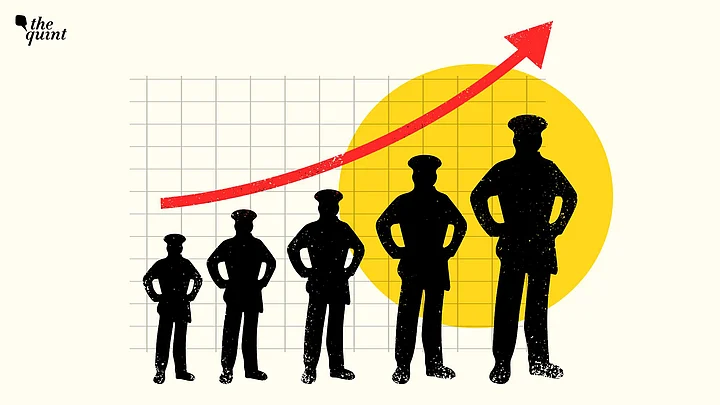India's private security industry is the world's largest, employing approximately 89 lakh personnel (2022), surpassing the combined strength of the police and paramilitary forces. According to the Ministry of Labour and Employment, this sprawling sector employs more people than the Indian Railways or the Army. The industry is valued at over ₹1.5 lakh crore and is growing at a compound annual growth rate (CAGR) of 20%, as per a 2023 report by FICCI and Grant Thornton.
In contrast, the Bureau of Police Research and Development (BPRD) reported in 2022 that India has approximately 28 lakh police personnel across all states and union territories. This means that for every government cop, there are over three private guards. In metropolitan cities like Mumbai, Delhi, and Bengaluru, gated communities, malls, tech parks, and hospitals rely almost entirely on these forces for day-to-day security.
What Explains the Boom?
Several factors contribute to this surge. Firstly, the police-to-population ratio in India stands at 158 per 100,000 people, well below the UN recommended figure of 222. State police forces are chronically understaffed, underpaid, and overburdened with non-investigative duties. Secondly, a rising middle class demands 24/7 security in a volatile environment marked by high crime perception and real estate vulnerability. Private guards have filled the vacuum left by the state.
The Private Security Agencies (Regulation) Act (PSARA), 2005, was introduced to standardise licensing, training, and operations of private security firms. However, implementation is patchy and varies drastically across states. Most guards do not undergo the mandated 160 hours of training, nor are firms audited regularly. According to a 2022 audit by PRS Legislative Research, less than 30% of active firms in major states had fully compliant licenses.
Worse, there's no centralised database of guards, making background checks easy to bypass. In many cases, individuals with criminal backgrounds or political affiliations slip through the cracks. For instance, in 2019, a guard hired by a housing society in Noida was found to have multiple assault charges in another state.
Power Without Accountability
While police officers are accountable to elected governments and public courts, private guards are accountable to their contractors or the clients who hire them. This has enabled many corporations and influential individuals to build mini-militias of personal security with little public oversight. In a few cases, private guards have been used as enforcers during protests or strikes.
The privatisation of public spaces further complicates matters. Railway stations, airports, and even government offices now often deploy private guards instead of police. This dilution of state presence in civic spaces raises serious questions about the erosion of state authority.
High Degree of Exploitation
The sociology of private security is rarely interrogated. Most guards come from economically weaker sections, often from remote areas of economically backward states, with little access to legal literacy or labor rights. They endure 12-hour shifts, are paid as low as ₹8,000 a month, and lack basic insurance or grievance redressal mechanisms. Their uniforms are crisp, but their contracts are not.
In many gated communities, these guards are treated more as orderlies than protectors; opening doors, parking cars, fetching parcels. On 22 April, residents and security guards clashed over the lack of a sticker on a car, leading to a heated argument and physical altercations at a gated society in Greater Noida.
“They treated us like pigs. Caste slurs were also used against the security guards”, Ankit Kumar, a security guard employed at the apartment complex, told Press Trust of India. On 19 May, the Mumbai police arrested 21 people after the security guards of a private company were assaulted by a group of people over a land dispute in Agripada area of Central Mumbai. One of the accused, who was carrying a "single-bore" rifle, allegedly opened fire at the guards, an official said.
In both the cases, the security guards were coaxed into withdrawing their FIRs, and returned to the same job, swallowing their pride, saluting and greeting the same people.
Most private security guards earn between ₹8,000 to ₹15,000 a month, work 12-hour shifts, and lack social security. The Wages Council for the Private Security Sector, formed in 2021, has yet to make tangible policy changes. Guards are often migrants, desperate for employment, and easy to coerce or compromise.
Security and Political Concerns
The most dangerous trend is the political patronage of private security firms. Some are run by former police or military officials with deep connections to political parties. There have been cases of private security firms being used during elections.
In 2023, the Ministry of Home Affairs flagged concerns about private guards near defence installations after a guard with expired credentials was caught filming near a sensitive DRDO lab in Hyderabad. This is no longer about theft or petty crime, the wrong hire could become a national vulnerability.
As India moves toward public-private partnerships in sectors like energy, telecom, and transport, the need for trained and accountable security grows exponentially. Yet, we are pumping manpower into an unmonitored pipeline. Worse, there is no comprehensive database of private security personnel. If a guard is dismissed for misconduct in Kerala, he can be rehired in Delhi next week.
India’s private security boom is not just a story of employment—it’s a story of security. In trying to patch up gaps in state policing, we have created a parallel, privatised regime that now employs more people than the army or paramilitary forces. Yet, we’ve failed to regulate, audit, or even recognise the latent power this sector holds. If left unchecked, these private armies could become a threat by themselves.
